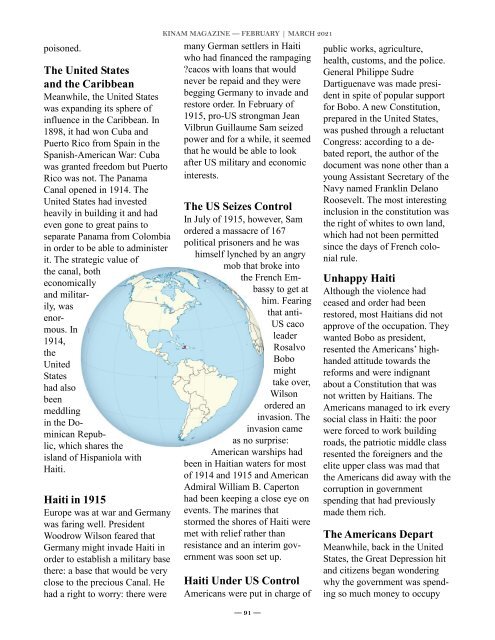Create successful ePaper yourself
Turn your PDF publications into a flip-book with our unique Google optimized e-Paper software.
poisoned.<br />
The United States<br />
and the Caribbean<br />
Meanwhile, the United States<br />
was expanding its sphere of<br />
influence in the Caribbean. In<br />
1898, it had won Cuba and<br />
Puerto Rico from Spain in the<br />
Spanish-American War: Cuba<br />
was granted freedom but Puerto<br />
Rico was not. The Panama<br />
Canal opened in 1914. The<br />
United States had invested<br />
heavily in building it and had<br />
even gone to great pains to<br />
separate Panama from Colombia<br />
in order to be able to administer<br />
it. The strategic value of<br />
the canal, both<br />
economically<br />
and militarily,<br />
was<br />
enormous.<br />
In<br />
1914,<br />
the<br />
United<br />
States<br />
had also<br />
been<br />
meddling<br />
in the Dominican<br />
Republic,<br />
which shares the<br />
island of Hispaniola with<br />
Haiti.<br />
Haiti in 1915<br />
Europe was at war and Germany<br />
was faring well. President<br />
Woodrow Wilson feared that<br />
Germany might invade Haiti in<br />
order to establish a military base<br />
there: a base that would be very<br />
close to the precious Canal. He<br />
had a right to worry: there were<br />
<strong>KINAM</strong> <strong>MAGAZINE</strong> — <strong>FEBRUARY</strong> | <strong>MARCH</strong> <strong>2021</strong><br />
many German settlers in Haiti<br />
who had financed the rampaging<br />
?cacos with loans that would<br />
never be repaid and they were<br />
begging Germany to invade and<br />
restore order. In February of<br />
1915, pro-US strongman Jean<br />
Vilbrun Guillaume Sam seized<br />
power and for a while, it seemed<br />
that he would be able to look<br />
after US military and economic<br />
interests.<br />
The US Seizes Control<br />
In July of 1915, however, Sam<br />
ordered a massacre of 167<br />
political prisoners and he was<br />
himself lynched by an angry<br />
mob that broke into<br />
the French Embassy<br />
to get at<br />
him. Fearing<br />
that anti-<br />
US caco<br />
leader<br />
Rosalvo<br />
Bobo<br />
might<br />
take over,<br />
Wilson<br />
ordered an<br />
invasion. The<br />
invasion came<br />
as no surprise:<br />
American warships had<br />
been in Haitian waters for most<br />
of 1914 and 1915 and American<br />
Admiral William B. Caperton<br />
had been keeping a close eye on<br />
events. The marines that<br />
stormed the shores of Haiti were<br />
met with relief rather than<br />
resistance and an interim government<br />
was soon set up.<br />
Haiti Under US Control<br />
Americans were put in charge of<br />
— 91 —<br />
public works, agriculture,<br />
health, customs, and the police.<br />
General Philippe Sudre<br />
Dartiguenave was made president<br />
in spite of popular support<br />
for Bobo. A new Constitution,<br />
prepared in the United States,<br />
was pushed through a reluctant<br />
Congress: according to a debated<br />
report, the author of the<br />
document was none other than a<br />
young Assistant Secretary of the<br />
Navy named Franklin Delano<br />
Roosevelt. The most interesting<br />
inclusion in the constitution was<br />
the right of whites to own land,<br />
which had not been permitted<br />
since the days of French colonial<br />
rule.<br />
Unhappy Haiti<br />
Although the violence had<br />
ceased and order had been<br />
restored, most Haitians did not<br />
approve of the occupation. They<br />
wanted Bobo as president,<br />
resented the Americans’ highhanded<br />
attitude towards the<br />
reforms and were indignant<br />
about a Constitution that was<br />
not written by Haitians. The<br />
Americans managed to irk every<br />
social class in Haiti: the poor<br />
were forced to work building<br />
roads, the patriotic middle class<br />
resented the foreigners and the<br />
elite upper class was mad that<br />
the Americans did away with the<br />
corruption in government<br />
spending that had previously<br />
made them rich.<br />
The Americans Depart<br />
Meanwhile, back in the United<br />
States, the Great Depression hit<br />
and citizens began wondering<br />
why the government was spending<br />
so much money to occupy

















